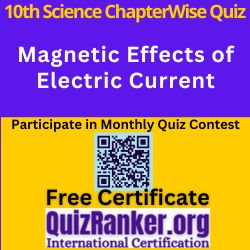10th Science Magnetic Effects of Electric Current MCQ Test Chapter 12: Enhance your understanding with free online multiple-choice questions for CBSE Class 10 Science Chapter 12. Explore the principles of electromagnetism, magnetic fields, and applications of electric currents. Perfect for CBSE exam preparation and competitive tests.
Magnetic Effects of Electric Current MCQ Test Quiz
Chapters of 10th Science for MCQ Test
You can not only check your knowledge about for “10th Science Magnetic Effects of Electric Current MCQ Test” but also all remaining chapters multiple choice questions.
Chapter 1 Chemical Reactions and Equations MCQ Test
Chapter 2 Acids, Bases and Salts MCQ Test
Chapter 3 Metals and Non-metals MCQ Test
Chapter 4 Carbon and its Compounds MCQ Test
Chapter 5 Life Processes MCQ Test
Chapter 6 Control and Coordination MCQ Test
Chapter 7 How do Organisms Reproduce? MCQ Test
Chapter 8 Heredity MCQ Test
Chapter 9 Light – Reflection and Refraction MCQ Test
Chapter 10 The Human Eye and the Colourful World MCQ Test
Chapter 11 Electricity MCQ Test
Chapter 12 Magnetic Effects of Electric Current MCQ Test
Chapter 13 Our Environment MCQ Test
Also Attempt Free 10th class Math chapter wise MCQ Quiz [For Exam 2025]
Must Attempt Monthly Quiz Contest
- Class 9th Science quiz contest monthly
- Class 9th Math quiz contest monthly
- Class 10th Science quiz contest monthly
- Class 10th Math quiz contest monthly
You can also participate in yearly national quiz contest Dec 2024
Important Link
- NCERT Books PDF
- Our Youtube Channel(Subscribe for view Few Quiz Question Answers)
About Magnetic Effects of Electric Current MCQ Test
Chapter 12 of the CBSE Class 10 Science curriculum, titled “Magnetic Effects of Electric Current,” delves into the relationship between electric current and magnetism. This chapter is crucial for understanding how electric currents generate magnetic fields and how these principles are applied in various technologies. The free MCQ quiz provided in this chapter will help students reinforce their understanding and prepare effectively for their CBSE examinations.
Key Concepts Covered:
- Magnetic Field:
- Definition: A magnetic field is a region around a magnet where magnetic forces can be experienced. It is represented by field lines that show the direction and strength of the field.
- Magnetic Field Lines:
- Properties: Magnetic field lines emerge from the north pole and enter the south pole of a magnet. They never intersect and are denser where the field is stronger.
- Magnetic Effect of Electric Current:
- Electric Current and Magnetic Field: An electric current flowing through a conductor produces a magnetic field around it. The direction of the magnetic field can be determined using the right-hand thumb rule: if the thumb points in the direction of the current, the curled fingers show the direction of the magnetic field.
- Solenoid: A solenoid is a coil of wire wound into a cylindrical shape. When current passes through a solenoid, it creates a strong and uniform magnetic field inside it. The field lines are parallel and closely spaced, resembling that of a bar magnet.
- Electromagnet: A temporary magnet created by winding a coil of wire around a ferromagnetic core (like iron) and passing an electric current through the coil. Electromagnets are used in various applications like electric bells and relays.
- Magnetic Field Due to a Current-Carrying Conductor:
- Straight Conductor: The magnetic field around a straight conductor is concentric circles centered on the wire. The field strength decreases with distance from the wire.
- Circular Loop: The magnetic field produced by a current-carrying circular loop is stronger at the center and follows the shape of the loop.
- Electromagnetic Induction:
- Faraday’s Law of Electromagnetic Induction: A change in the magnetic field within a closed loop induces an electromotive force (EMF) or voltage in the loop. This phenomenon is known as electromagnetic induction.
- Lenz’s Law: The direction of the induced EMF and current is such that it opposes the change in magnetic flux that produced it.
- Electric Motors and Generators:
- Electric Motor: A device that converts electrical energy into mechanical energy using the interaction between a magnetic field and current-carrying conductors. It consists of a coil (armature) placed in a magnetic field, which experiences a force and rotates.
- Generator: A device that converts mechanical energy into electrical energy using electromagnetic induction. It involves rotating a coil within a magnetic field to induce an EMF.
- Applications of Magnetic Effects:
- Magnetic Compass: Uses the Earth’s magnetic field to determine direction.
- Transformers: Devices that change the voltage of alternating current (AC) using electromagnetic induction.
- Induction Cooktops: Use electromagnetic induction to heat pots and pans directly.
- Electromagnetic Waves:
- Definition: Electromagnetic waves are waves that propagate through space carrying electromagnetic energy. They include radio waves, microwaves, infrared, visible light, ultraviolet, X-rays, and gamma rays.
Quiz Structure:
The MCQ quiz for this chapter includes a series of questions designed to test students’ understanding of magnetic fields, the effects of electric current on magnetism, electromagnetic induction, and practical applications. These questions cover definitions, principles, and practical scenarios related to electromagnetism. The interactive format allows students to practice and assess their knowledge effectively.
Conclusion:
Practicing with the 10th Science Magnetic Effects of Electric Current MCQ Test Chapter 12 is an excellent way for CBSE students to prepare for their exams. This chapter provides a comprehensive understanding of how electric currents generate magnetic fields and the applications of these principles in technology. The MCQ quiz helps reinforce these concepts, ensuring students are well-prepared for their academic assessments and competitive exams.
Total Views: 43
